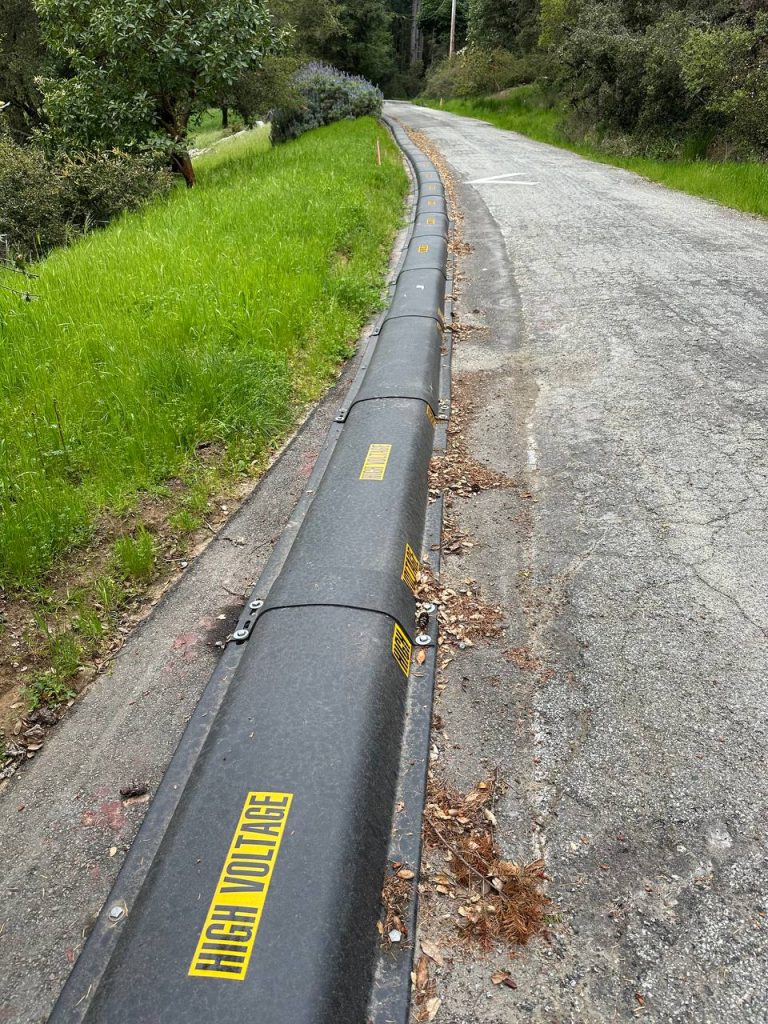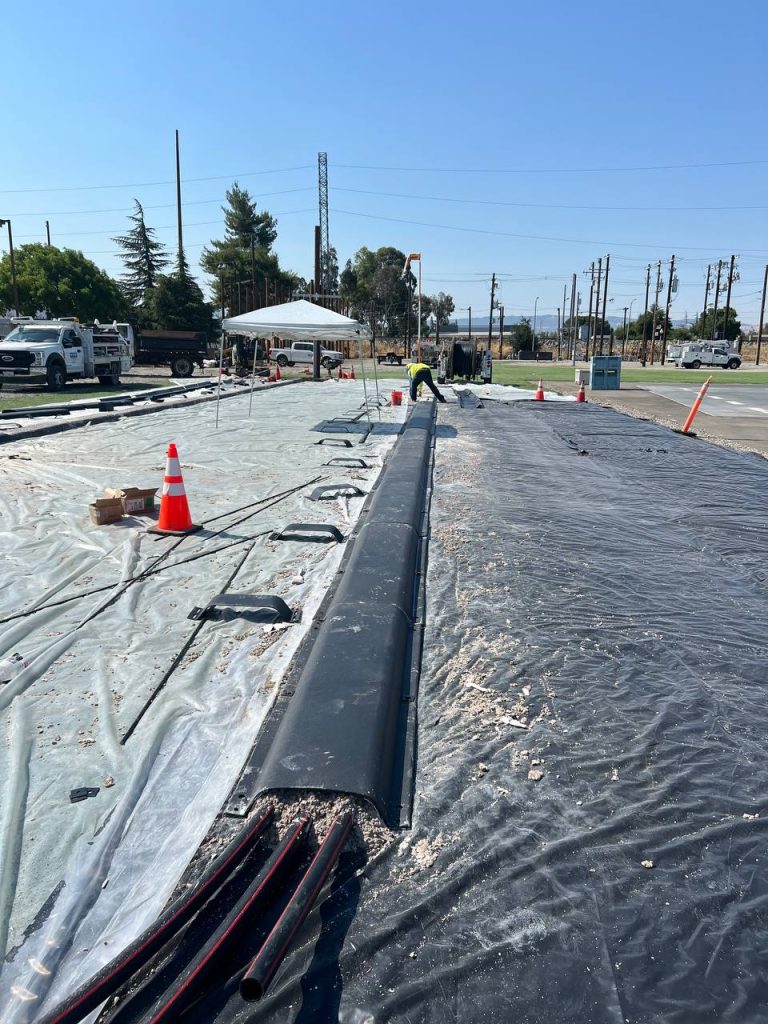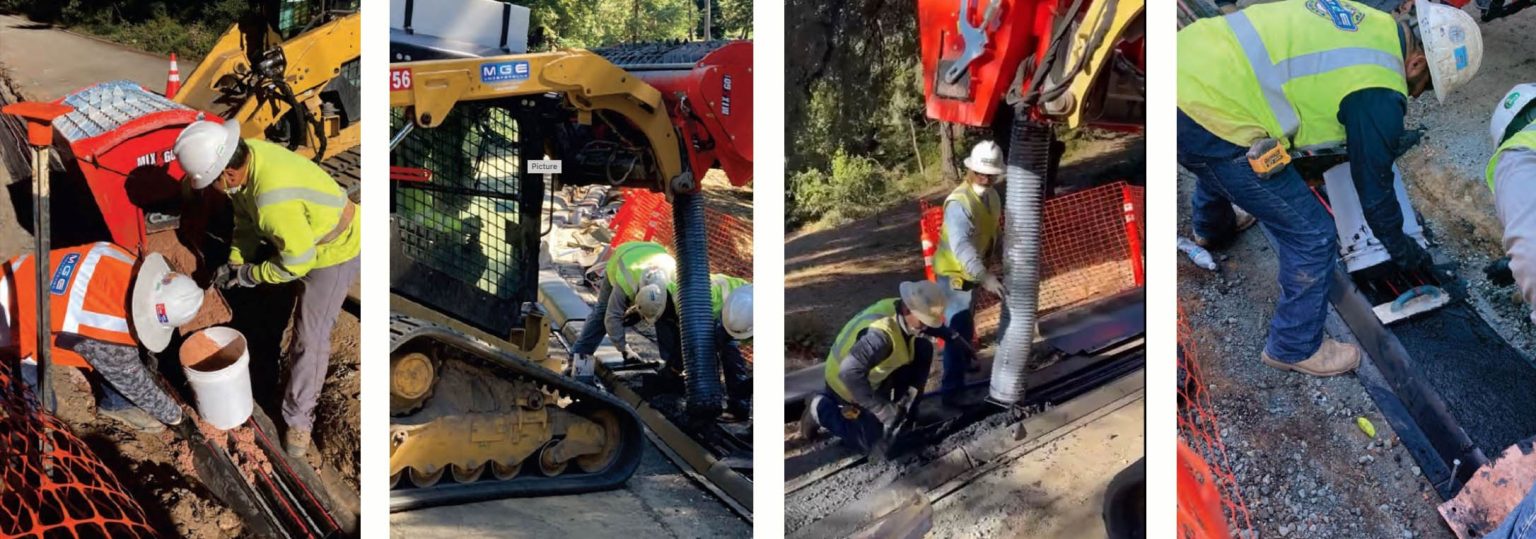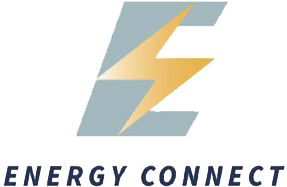PROBLEM:
Electric Distribution Systems can face rural, environmental, climate and ignition challenges, which do not have a cost effective or efficient solutions.
SOLUTION:
GLDS
MCC SYSTEMS




Ground Level Distribution System (GLDS)
Above ground cable tray system comprised of standard EPR under ground primary cable inserted into HDPE conduit, then encapsulated in epoxy resin concrete shrouded with the flame retardant polymeric compound cable tray. The low profile contoured design permits vehicle drive over.
Rapid deployment where trenching is not possible due to:
- excessive ground hardness, rocky soil
- inaccessibility for trenching equipment
- inability to dig in sacred land
High strength flexibility:
- Balanced epoxy's in concrete
- Graphite grid reinforced with fiberglass to minimize cracking
- Light weight mix to pump and deploy in remote locations
- Water-free mix impervious to fire spalling and cracking
- Maximum heat dissipation capability to maintain cool temperature within HDPE conduit
- Standard add-mix components with no special tools or techniques required to pour
Engineered Composite Cable Tray:
- Impervious to UV and high flame temperature resilient (UL94, V-0)
- RoHS Compliant and specifically designed for flame retardancy
- Ability to embed line marking and safety warnings
- Configurable to meet multiple bend and riser layouts
- Snap together rapid installation feasibility
- Configurable to meet 1/0 to 1,100 kcml single and three phase designs
- Configurable add fiber optic or additional communication cable options
HDPE conduit
- Standard design already utilized at PG&E
- Smooth wall provides less pulling resistance
- Less joints and fit up
Minimum Cover Cable System (MCC)
Developed by a former Utility Engineer and construction team in partnership with Rudd Engineering Consultant. MCC incorporates the same GLDS technology, but utilizes a pavement/soil excavating machine to cut a minimum depth trench into which to lay the GDLS.
| SAFETY | RELIABILITY | AFFORDABILITY |
| Eliminates overhead ignition risk Removes overhead vegetation removal and working risks for crews Removes standard underground trenching hazards and spoilage removal Multilayers of arc protection: Outer Trays (Flame Retardant TPO polymer compound) Fireproof or Super concrete (proprietary blend) Inner HDPE conduit Standard fully insulated primary cable | Eliminates PSPS shutdowns • Removes animal, tree fall, and vegetation caused outages entirely | Lowers the cost of standard trenching |
ADVANTAGES OF THE SYSTEM
| Increased Reliability and Availability of Power | As it relates to external implications, such as, high winds or storms |
| Maintenance Free System | This system, like UG conduit, does not require any specific maintenance. However, cyclic visual inspection could potentially be the same as our ground mounted equipment (GO 165 – 3 Year inspection cycle) to ensure the integrity of the cable system is not compromised in any way. |
| Lower Costs | Eliminate or reduce cost in vegetation management. |
| Eliminate Risk | Tree/root growth into facilities (as experienced in underground systems) Dig-ins as well as clear indication of high-power line. |
| Environmental Hazard Management | Support leach field challenges and methane gases below ground |
| Vehicle Access | Minimal elevation from the ground will allow vehicle access (e.g., Emergency response, Fire trucks, etc..) |
| Combat Utility Easement Challenges | Potential Application and solution for Utility Easement (PUE) challenges (e.g., limited space) |
| Special Applications and Solutions | For agricultural concerns with traditional under grounding ( ie. farms/wineries, GLDS offers a solution without disturbing the roots) |
| Emergency Management | Cable runs above ground ( Secondary Network System events) |
Cable Rail System & CIC Installation


Geopolymer Fill Material




